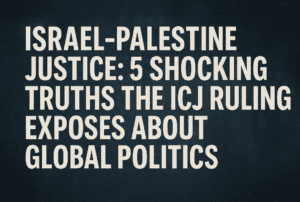Israel-Palestine Justice: 5 Shocking Truths the ICJ Ruling Exposes About Global Politics
The 2024 International Court of Justice (ICJ) ruling on Israel’s occupation of Palestinian territories sparked global debate, especially due to the fiery dissent of Judge Julia Sebutinde, who argued for political negotiation over judicial intervention. The ruling, which condemned Israel’s actions as violations of international law, highlighted the deep divides in global opinion on the conflict. Sebutinde’s stance, urging dialogue, contrasted with the majority view, igniting accusations of bias.
While international law can delegitimize occupation, it alone cannot resolve the complex, century-old dispute fueled by trauma and competing national aspirations. The human cost of the conflict continues to rise, underscoring the need for multifaceted solutions involving legal, diplomatic, and economic pressures. Yet, entrenched power dynamics and ideological divides hinder progress. The path to peace demands a nuanced approach, blending legal action with political dialogue, empathy, and the courage to confront power. Only through a combination of these efforts can a lasting solution be found.

Israel-Palestine Justice: 5 Shocking Truths the ICJ Ruling Exposes About Global Politics
The International Court of Justice’s (ICJ) 2024 advisory ruling on Israel’s occupation of Palestinian territories ignited global debate, not only for its legal conclusions but for the fiery dissent of Ugandan Judge Julia Sebutinde. Her minority opinion—arguing that the conflict demands political negotiation, not judicial intervention—has drawn outrage, admiration, and accusations of geopolitical bias. Yet beneath the uproar lies a deeper question: Can international law alone resolve a century-old struggle steeped in trauma, power imbalances, and competing narratives of survival?
The ICJ Ruling and the Dissent That Divided the World
In July 2024, the ICJ concluded Israel’s occupation violated international law, ordering reparations and urging the UN to expedite its end. The 14-1 vote underscored global consensus, but Justice Sebutinde’s dissent became a lightning rod. She contended that courts cannot untangle a conflict rooted in “clashing national aspirations,” advocating instead for dialogue. Critics dismissed her stance as tone-deaf, while others saw pragmatism. Her Ugandan ties—to a nation balancing AU solidarity with Israeli partnerships—fueled speculation, though evidence of impropriety remains absent.
A Conflict in Context: From Legal Battles to Battlefields
The ICJ ruling arrived amid escalating violence. Israel’s 2023 invasion of Gaza, triggered by Hamas’ October 7 attacks, had already killed tens of thousands, displaced millions, and decimated infrastructure. South Africa’s genocide case at the ICJ and the International Criminal Court’s (ICC) indictment of Israeli leaders further polarized the global community. The U.S., under a resurgent Trump administration, lambasted the ICC, threatening sanctions and emboldening Israel’s military campaign.
Meanwhile, the court of public opinion diverged sharply. Mainstream media often echoed governmental stances, framing Israel’s actions as self-defense, while social media amplified Palestinian suffering—starving children, bombed hospitals, and mass graves. Yet Hamas’ authoritarian rule and refusal to recognize Israel’s right to exist rarely featured in viral posts, illustrating how narratives fracture along ideological lines.
Justice vs. Realpolitik: The Limits of Law
Sebutinde’s dissent exposes a harsh reality: Legal victories alone cannot enforce change. The ICJ lacks an army; its rulings depend on political will. The UN Security Council, paralyzed by U.S. vetoes, has repeatedly failed to curb Israeli settlement expansion or blockade relief. Even the ICC’s arrest warrants face defiance, as Israel and allies like the U.S. dismiss its authority.
History offers cautionary tales. South Africa’s apartheid regime crumbled not just through ICJ condemnations but via grassroots activism, sanctions, and shifting global alliances. Similarly, Israel-Palestine requires multifaceted pressure: legal accountability, economic leverage, and diplomatic carrots-and-sticks. Yet current dynamics favor stagnation. Netanyahu’s government relies on far-right coalitions advocating annexation, while Hamas’ charter rejects coexistence. With the U.S. shielding Israel and Iran arming proxies, the cycle of retaliation deepens.
The Human Cost and the Path Ahead
Over 50,000 Palestinian deaths, 1,200 Israeli casualties, and countless shattered lives underscore the urgency. Yet solutions remain elusive. A two-state framework, eroded by settlements and distrust, seems a distant mirage. A single democratic state, feared by Israelis as demographic suicide, faces rejection.
Sebutinde’s call for negotiation, though criticized as naive, acknowledges this impasse. Legal rulings can delegitimize occupation but cannot draft treaties or build trust. Conversely, dismissing law risks normalizing annexation and apartheid. The answer may lie in synergy: using ICJ rulings to bolster diplomatic efforts, leveraging boycotts to pressure Israel, and conditioning aid to Palestinian leaders on democratic reforms.
Conclusion: The Imperative of Nuance
The Israel-Palestine conflict resists binary narratives. Condemning Hamas’ brutality does not negate Palestinian rights; criticizing Netanyahu’s policies is not antisemitism. Justice Sebutinde’s dissent, though contentious, reminds us that law and politics are intertwined—neither sufficient alone. As the world grapples with this intractable feud, the voices of ordinary Israelis and Palestinians—yearning for security and dignity—must guide the search for a just, if imperfect, peace.
The ICJ’s ruling is a milestone, but the road ahead demands more than verdicts. It requires courage to confront power, empathy to humanize enemies, and the audacity to imagine coexistence. Without these, the gavel’s echo will fade into the void of endless war.
You must be logged in to post a comment.